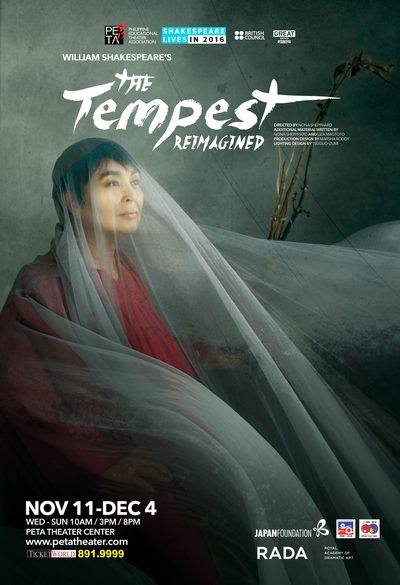‘The idea started with a storm,’ Maribel Legarda, PETA’s artistic director, explains.
The Tempest Reimagined is an adaptation of William Shakespeare’s last solo work, The Tempest, and incorporates narratives from survivors of Yolanda (International name: Haiyan), a super typhoon that hit the Philippines in November 2013 and claimed 6,000 lives.
Theproduction between the British Council and the Philippine Educational Theater Association (PETA), in partnership with the Royal Academy of Dramatic Art (RADA) and the Japan Foundation takes audiences from a fictional island on the Mediterranean to the tropical coast of Leyte.
A noteworthy artistic collaboration
At the helmis an impressive collaboration between RADA director and writer Nona Shepphard, Liza Magtotoof PETA as co-writer; British designer Marsha Roddy asproduction designer, and Japanese Tsuguo Izumi as lighting designer.
The fusion of East and West extends to the play’s script, which usesboth the English and Filipino languages. The story includes the real and the imagined, the natural and the supernatural, the comic and the tragic— all in the tradition of Shakespeare.
‘One of the reasons that Shakespeare’s work is so enduring is because it is endlessly adaptable. The moral complexity of his characters and the apparent broadness of Shakespeare’s own sympathies allow for any number of interpretations. Every production of ‘The Tempest’, for example, reveals new perspectives on Prospero or Caliban and encourages us to reflect again on the meaning of power and loss,’ Nick Thomas, British Council Country Director, explains. The British Council, together with the GREAT Britain campaign, is running the Shakespeare Lives programme, whichcelebratesthe bard’s work on the 400th year of his death.
Bodjie Pascua, renowned theatre and television actor, plays Gonzalo in The Tempest Reimagined.
UK’s response to Yolanda
When Yolanda hit the Philippines three years ago, the United Kingdom was among the first countries to respond. People in Britain saw the urgent need of the victims and so the largest ever humanitarian assistance was mobilised by the UK Government.
‘Following the devastation brought upon by Typhoon Haiyan, the people of Great Britain raised P7 billion which was matched by taxpayer’s funds by the Government. A 1,400-strong military and civilian team worked with international partners to deliver help directly to those in need,’ recounts Ambassador Asif Ahmad.
‘Our objective was, quite simply, to provide immediate food, shelter and logistical support to people facing hardship. Some of our projects will have a longer term impact on livelihoods as better preparation for future natural disasters. Our self-sustaining approach to delivery was mindful of the need to avoid additional pressure on Filipino institutions that faced the daunting challenges brought about by Haiyan,’ he adds.
In 2015, Shepphard, with the support of the British Council and PETA’s LingapSining programme, also visited Leyte for workshops that use theatre in tackling disaster response and resilience in communities. The stories of hope and survival that arose from this trip would eventually end up in the play’s script.
The Tempest Reimagined opens on 11 November on the occasion of Yolanda’s third year anniversary, and runs until 4 December at PETA Theater in Quezon City. Tickets are available at https://ticketworld.com.ph.
The 11 November premiere gala is supported by the GREAT Britain Campaign and hosted by the British Council, British Embassy, and British Chamber of Commerce.
For more information on artist profiles, visit https://www.britishcouncil.ph/programmes/arts/theatre/tempest-reimagined.
Notes to Editors:
The British Council is the UK’s international organisation for cultural relations and educational opportunities. We create friendly knowledge and understanding between the people of the UK and other countries. Using the UK’s cultural resources we make a positive contribution to the countries we work with – changing lives by creating opportunities, building connections and engendering trust.
We work with over 100 countries across the world in the fields of arts and culture, English language, education and civil society. Each year we reach over 20 million people face-to-face and more than 500 million people online, via broadcasts and publications.
Founded in 1934, we are a UK charity governed by Royal Charter and a UK public body. The majority of our income is raised delivering a range of projects and contracts in English teaching and examinations, education and development contracts and from partnerships with public and private organisations. Eighteen per cent of our funding is received from the UK government.





